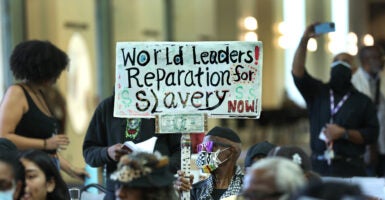The San Francisco Board of Supervisors is talking about ideas to bring racial reparations to the Bay Area.
The proposals discussed during a recent board hearing, if adopted, would come with a significant financial cost for taxpayers. More on that in a bit.
The entire reparations plan is predicated on the idea that black residents of San Francisco need to receive massive financial benefits from the city to make up for slavery and systemic racism.
Now, plenty of arguments can be made against reparations. As a matter of justice and improving “equity,” which the Left obsesses over, these proposals leave a lot to be desired.
“Legal or not, reparation plans are deeply flawed and often create new injustices in implementation,” I wrote in September. “In the end, they are based on the premise that the only way to get ahead in society is to claim victimhood and shake down your neighbors.”
The case for reparations in California for U.S. slavery is particularly tenuous. California famously entered the Union as a free state. The number of black slaves brought to California before its statehood was marginal.
If San Francisco’s plan passes, every non-oppressed resident will be busy handing over every last dollar they’ve earned to the government.
San Francisco’s reparations plan includes giving $5 million to every black adult resident of the city. But wait, there’s more.
In addition to the proposed lump sum, the board is considering lifting all tax and debt burdens for black residents, giving them homes in exchange for $1, and paying them $97,000 a year for 250 years.
Interestingly, the mandatory requirement for eligibility listed in the report is “an individual who has identified as ‘Black/African American’ on public documents for at least 10 years.”
Given the financial incentives at stake here, if a law like this ever passed, 100% of San Francisco soon would identify as “Black/African American.”
Among the other qualifications in addition to race is being incarcerated for a drug crime or being a descendant of someone who was.
The plan brings up some big questions, like how is the city going to come up with what seems like a whole lot of money over a whole lot of time?
“There’s no timeline,” said Tinisch Hollins, vice chairman of the city’s reparations advisory committee. “Centuries of harm should be met with centuries of repair. That extends beyond financial compensation.”
Stanford University’s Hoover Institution, a conservative think tank, did a financial analysis of the reparations plan.
Now, San Francisco may not be what you would call the most fiscally conservative or prudent of places. This is a city that’s decided to pump money into a giant floating pool in the San Francisco Bay, after all.
Still, and I’m sure you’ll be surprised about this, it turns out that San Francisco makes La-La Land seem sane when it comes to the reparations proposal.
Hoover estimated that 46,466 African Americans live in San Francisco, based on the census—which could be a lowball estimate, given the incentives and loose categorization of the reparations plan.
To pay $5 million to each person would cost $175 billion. For reference, San Francisco’s city budget last year was $14 billion. Seems there will be a bit of a shortfall.
In fact, according to Hoover’s analysis, the dollars owed would exceed every state budget except those of California, New York, and Texas.
The financial burden, “on a per-household basis, will be nearly $600,000 per non–African American San Francisco household,” the study concluded.
Even in a city that’s home to former House Speaker Nancy Pelosi and friends, that would be a bit much. It seems the burden might grow, too, as pilfered residents leave and the ratio between reparations payers and payees narrows.
These estimates don’t factor in supplemental payments that extend for 250 years, debt liabilities, and essentially free houses for black residents.
So, the plan is to create a kind of racial, financial aristocracy lasting longer than the entire history of the republic thus far. It’s a system whereby the taxpayers—pretty much all of whom had nothing to do with slavery—effectively become serfs, forking over most of their earnings to millionaires whose qualifications include skin color and arrests for drug crimes.
Now, a few Bay Area residents have caught on that this plan is a bit kooky and unrealistic. Can you take a guess at what the board’s response to criticism has been? Supervisor Rafael Mandelman called opponents “overheated and irrational.” A San Francisco Chronicle reporter wrote that the backlash was fueled by racism.
Don’t expect a lot of financial help from the state of California. The Golden State could be having its own crisis soon if it pursues its own separate reparations plan.
“The California Reparations Task Force, which was created by state legislation in 2020, is considering a proposal to give just under $360,000 per person to approximately 1.8 million Black Californians who had an ancestor enslaved in the U.S., putting the total cost of the program at about $640 billion,” Fox News reported Monday.
The issue is being put to the state Legislature, but Fox News reported that activists are pressuring Gov. Gavin Newson, a Democrat, to sign an executive order that would simply enact the task force’s recommendations.
Are either of these plans likely to go into effect?
The NAACP came out against San Francisco’s proposal on the basis that it gave false hope to black residents. That’s undoubtedly true. Obviously, San Francisco doesn’t have the ability to pay even a small percentage of what it’s considering, and likely will come up with a reason to torpedo the plan at some point.
Still, it’s telling that San Francisco and California as a whole are relentlessly pursuing reparations, just as activists and the state’s institutional elite try to foist affirmative action on voters who mostly reject the idea.
Our institutions, especially government bureaucracies, are run by Jacobins who’ve abandoned the idea of legal and governmental neutrality in favor of militant ideological crusading on behalf of diversity, equity, and inclusion.
According to the diktats of wokeness—essentially metastasized social liberalism—all the inequalities of our system are based on systemic injustice and must be remedied through various extreme leveling measures that often mimic the segregation and oppression that allegedly caused all our iniquities to begin with.
These reparations proposals will only divide and destroy. They create the impression that the only way to succeed is to qualify as an oppressed class or generally work the system.
If San Francisco and California really want more equality and to build equity, they should abandon reparations and focus on getting crime and drug use under control while promoting the formation of two-parent households with a mother and father.
They should do that instead of promoting a racial spoils system that’s divorced from fiscal reality.
Have an opinion about this article? To sound off, please email [email protected], and we’ll consider publishing your edited remarks in our regular “We Hear You” feature. Remember to include the URL or headline of the article plus your name and town and/or state.






























